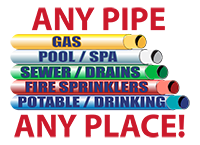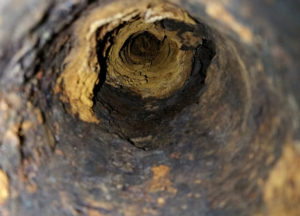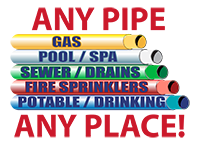Do you have a rotten sewer gas smell coming up through your drains? You may need a sewer gas detector to check for this common household problem.
Here’s what may be going on inside your home’s plumbing. Each of your home’s plumbing fixtures has a drain that leads to the wastewater removal pipes. When this system works properly, it doesn’t just carry solid and liquid wastes outside to the sewer or septic for treatment, but it also keeps bacteria and rotten-smelling sewer gases from coming inside your home through your drains.
When it doesn’t, though, sewer gas comes up through the drains into your home. Learn about this common sewer line problem and how to detect it from the piping experts at San Diego Plumbing and Pipelining.
Sewer Gas Prevention Requires Well-Maintained Traps and Vents
The key to keeping these gases at bay is the system of traps and vents built into your home’s wastewater plumbing.
Drain traps: Traps are those curved pipes you can see below your sink when you open up your vanity. Filled with a small amount of water, traps seal off the gases below—formed by decomposing wastes–from the drains above.
Drain vents: Vents equalize the pressure inside these waste pipes by allowing the sewer gases to flow up to the roof through a special pipe, called the soil stack, and then into the outside air.
Sewer Gas Telltale Sounds and Smells
When this system malfunctions, the pressure imbalance can cause high pressure within the drains, forcing the sewer gas up through drains, traps, and toilets. When that happens, you’ll hear a gurgling sound when you run water down a drain. That sound may even sound like it’s coming from another fixture, since the gas bubbles through the water, trying to find somewhere to escape.
Time to Call a Pipefitter for a Sewer Gas Check
If you hear that gurgling sound, put your nose close to one of your drains. Chances are you’ll smell a nasty, rotting odor. That’s when you need to call your local pipefitting pro for a checkup. She or he has a special tool, called a sewer gas detector, that will correctly identify whether the smell is indeed sewer gas.
If so, you need to identify the cause.
Possible Causes of Sewer Gas
Broken seals: It may be something as simple as an air leak around your toilet’s wax ring. A broken seal, whether it’s in the vent pipe or the wax ring around your toilet, can allow water—which serves as a barrier to sewer gas—to escape, causing the trap to dry out. When that happens, the gas seeks the closest spot to escape, which is most often into your home. Your pipefitter will check to see if your toilet rocks from side to side. If so, your seal is broken—a relatively easy fix.
Dry trap: If you haven’t used a drain for a while, the drain’s trap might have dried up. This, too, is easy to cure. Just pour about a quart of water into the drain.
Faulty trap: If your trap is old, it may have tiny cracks or breaks in it that allow the gases to flow into your home instead of outdoors. Remember, gas exits at the nearest possible spot. If that’s through a crack in the trap, that’s inside your home. Although it’s not an easy fix, it’s a long-lasting one. Your pipefitter can reline your pipes, including your trap, to create an unbroken seal throughout the pipe’s length, allowing the sewer gas to vent outside as it should.
Debris in the sink overflow: Your sink likely has overflow holes to prevent water from flooding your home, should you leave your faucet on while the drain is plugged. On the other side of the hole is a chamber. Often, over time, debris accumulates, causing an odor. For this, a combination of a strong cleaner and bleach is usually enough to clear up the rotten sewer gas smell.
Vent line leaks: Your pipefitter will check your vent line system for loose fittings, holes, or corrosion. Old metal pipes are especially vulnerable to rust, allowing them to leak sewer gas into your home. Relining your vent line with a non-corrosive material will usually fix this problem. Of course, if it’s just loose fittings, a simple turn of a pipe wrench may be all that’s needed.
Cracks in the piping itself: Older homes often have cast iron pipes. Over time, cast iron can develop cracks, which will allow gases to escape. The pipefitter will check the pipes for leaks throughout the system. In most cases, you won’t need expensive replacement. Relining with a tough, modern material can usually solve the problem for much less.
Clogged vent pipes: Over time, your vent pipes can become clogged, keeping the gas from venting into the outside air. If you haven’t had your vent pipes cleaned for a while—or ever—it’s worth looking into. Your pipefitter can clean out the pipes easily, allowing free passage of the noxious gases safely outside your home.
Leaks in pipes underneath a slab foundation: If your home has a slab foundation, pipes run underneath or through the slab. Your pipefitter can check if this is the cause of your sewer gas with a test called a “smoke test.” He will block all of your home’s drain vents and then blow smoke through the vent. He will check for a smoke smell inside your home. Those places that have a smoke smell are where you likely have leaks. Again, relining those pipes is a much easier—and much less expensive–solution than tearing up your home’s slab to replace the piping.
The Dangers of Sewer Gas
You might think to yourself, “What’s a little smell? Just plug in a little scented oil, and no one will notice.” Wrong move. Sewer gas contains both bacteria and methane gas, both hazardous to human health. It can even carry airborne mold spores, which can lead to severe reactions in sensitive people.
Sinus and other respiratory infections: Though your respiratory system and immune system usually do a good job of filtering the air and fighting off airborne bacteria, an overload of the little beasties, such as happens when your home contains sewer gas, can overwhelm your body’s natural defenses. Children, the elderly, and those with chronic respiratory problems are at greatest risk, but anyone can develop health issues due to these pollutants.
Risk of explosion with methane at high concentrations: Though not as reactive as natural gas, methane—in high enough concentrations—can explode if a random spark flies through the air.
Beware of Home Remedies for Sewer Gas Smell
Chemical remedies: Often DIY articles will recommend a combination of common household chemicals. Be sure to check everything you read with an expert before you attempt anything on your own. For example, mixing bleach and vinegar, common ingredients in many of these DIY remedies, can cause toxic fumes—chloramine and chlorine gases. If you do use any of these household remedies, be sure to follow your pipefitter’s or plumber’s exact instructions. Failing to do so can cause you to land in the hospital—or worse.
Boiling water remedy: Many homeowners ask—with good reason—if pouring hot water down a drain to loosen up a clog works, why not boiling water? After all, the hotter the better, right? Wrong. If your homes plumbing system contains PVC components or rubber fittings, boiling water can cause them to melt, providing additional spots where sewer gas will leak out. If you do try the hot water treatment, make sure it’s 175 degrees Fahrenheit or cooler.
Finding the Right Pipefitter to Handle Sewer Gas Problems
If your stab at home remedies—or replacing the toilet ring, doesn’t work, you need to find a dependable pipefitter. Don’t just settle for the first person that turns up in your Internet or phone book search. Do your homework.
Hire a professional: Sewer gas problems require a pipe professional: Sewer gas issues aren’t something you should turn over to your local handyman. A professional pipefitter is the right person to call for this highly technical job.
Hire a pipefitter with the proper equipment to detect sewer gas: Without a sewer gas detector, diagnostics can be a bit of a guessing game. That takes time—and you’ll pay for those extra hours. With proper sewer gas detection equipment, though, you can get to the bottom of your problem in a matter of minutes.
Hire someone with pipelining experience: When you look for a pipefitter, find someone who has the equipment to reline your pipes. Unless you’re a billionaire with money to burn, you need someone who can offer you an alternative to expensive pipe replacement. Lining your pipes can provide a long-lasting solution without the added expense and mess of tearing out your old system.
Hire a pipefitter who has all the proper training and paperwork: Always hire pipefitters who have plenty of experience and training in detecting the cause of sewer gas smell. Insist—at the very least–that they are licensed, bonded, and insured.
To learn more about how to detect and repair sewer gas leaks, contact the pipelining experts at San Diego Plumbing and Pipelining today.








